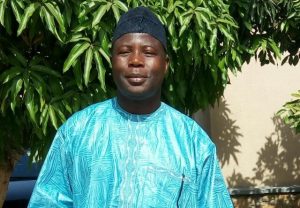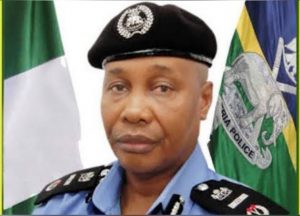By Adagbo Onoja
President Bola Tinubu is still playing the appointments card by which Nigerians tend to judge the direction of an incoming president. So far, his score card is not reading badly on that. Let’s start looking at the last batch – service chiefs – by isolating the Police chief – IGP Kayode Egbetokun.
It must be great to be an IGP of the Nigerian State, a unique opportunity to put one’s name in history positively. Even at the best of times, that is a bundle of challenges except that it can be said that too that Nigeria is in that condition which can be called the Police moment, with an IGP who had previous relations with the Commander-in-Chief and the National Security Adviser (NSA) being an ex-police bigwig too. If the reform that should shake and transform the Nigeria Police into a 21st century Police doesn’t happen soon enough, then it might never happen again. For it to happen, citizens must pile enough pressure on the IGP, the president himself and the NSA, amongst others. Goodluck to a new IGP.
By late 2016, when the perception that former president Muhammadu Buhari was the one masterminding the insecurity arising from ‘herdsmen’ attacks around the country, Intervention sought out a bold Peace Researcher in Prof Shadrack Best. He was asked to analyse that controversy. That was long before criticism of Buhari became what Wole Soyinka would call ‘disco criticism’ – gbam, gbam, gbam – until Chief Obasanjo showed such critics the folly of their exertion. Obasanjo said Buhari had reached the limit of his capability and no amount of criticism could make any difference.

Prof Best
Back to the December 2016 interview with Prof Best. One deeply interesting argument of the Professor of Peace Studies is that Buhari is perceived as such and stood implicated in the attacks because any president who wants any set of criminals in the net can easily achieve that. Intervention asked him how and his answer was and is that “People simply do not want to manage security. If the president tells the IG of Police that he wants arrests, he will get it” (follow this link to the interview which has been republished two other times on this same platform).
Prof Best’s standpoint remains a powerful argument on two grounds. The first ground is that he was offering a reinforcement of the Paris School of Security Studies that security is about power, not about threats. The second is the power of the Police as an institution. The Police is far more powerful than is reckoned with. It is so lucky nobody monitors it as such because it is erroneously seen as inferior to the military when, in fact, the two are not comparable. The relationship between the two is one of difference, not superiority or inferiority. They are set up to do two different things and there is no basis for mistaking one for the other although 21st century security practices have gone beyond that separateness. Nowadays, the police and the military are fused together in most of the campaigns because war targets have changed. But that is a matter for another day.
In Nigeria, there is the joke that to find a good IGP is like finding a compatible wife. Whoever finds a compatible wife has solved more than half of his problems. So, a Commander-in-Chief who finds a good IGP has solved more than half of his problems. How?
It follows from the analogy about the police being so powerful. As Dele Giwa, the late slain journalist, once put it, every IGP knows all the bad guys in town. It is said that the equally late Sunday Adewusi, IGP under the Shagari administration in the Second Republic, never forgave Giwa for that claim. But at issue is not who, between Giwa and Adewusi, all of blessed memory today, is correct. Rather, what it means is that a sitting IGP can be very powerful. As such, a President Tinubu appointing a police acquaintance of his as IGP can be equated with finding a ‘good’ wife in the sense that he has got someone who will shield the president and the government from the police as well as from the bad guys in town. What could police chief who can shield the president and the government from the police mean? Could the Police be a threat to a sitting government?
That the Police could be a threat to a sitting government in Nigeria may not be such an outrageous statement. But it is not in the sense that the Police is involved in any deliberate subversion of the state but that a number of things associated with the Police implicate it as such. Let’s take a few such examples.
No one can be sure that the Police understands that Nigeria is, by demography, the symbol of the black world. Doesn’t policemen and women in uniform doing some of the things they do with drivers, transporters and sundry travelers make a complete mess of that status of the country since this happens in every imaginable space of police presence across the country. And they do so in the presence of other Africans and other blacks? Policemen in other African countries might engage in this but not the Nigerian policemen and women because Nigerian policemen and women are not just policemen and women. They are part of the frontier warriors of the idealism called leadership of the black race. Idealism here does not mean fantasy.

Immediate past IGP, Alkali Baba who tried to discipline policemen fond of intimidating citizens
The second point in proof of the allegation comes like this. The late Abdulkadir Balarabe Musa once predicted that the police would trigger a revolution in Nigeria. That almost came to pass in 2020 with the #EndSARS revolt. Till this moment, police operatives provide evidence that supports the thesis on a daily basis. One of such is the orientation and attitude of the average policeman to the average citizen. In most cases, it is worse than the attitude of the colonial police officer to his black colonial subjects. That attitude contradicts the principles of independence and citizenship. In the business of the nation state, the citizen is the king. All other actors, including the president, are servants of the citizen in the republican state. That attitude and orientation makes one wonder what police recruits are taught in the police colleges around Nigeria or have the colleges collapse absolutely?
Third, several reports have shown that the Nigerian Police practice torture for criminal allegations that are so petty. Intelligence agencies use torture, particularly in the wake of 9/11 but even then, it is a breach of the ethics even in that field. And there are serious campaigns against it, including court cases ending in victory for those who took such security agencies to court around the world, particularly the USA. The discretionary room allowed a typical police operative in his or her day-to-day exercise of authority is so vast that all such operatives must be sensitive to that imbalance. Moreover, the typical police operative on the road is armed while the average citizen is not armed. Even those who are armed cannot match police operatives in a test of strength, notwithstanding the rise of well-armed, very determined and therefore dangerous practitioners of criminality in recent years.
There is the more serious crisis of image of the Nigerian Police. A one-time Director in the Ministry for Police Affairs once told Intervention that the problem of the Police is the Police itself. His example is this: if you give the Police N10b today and the same amount to the Army, the Army will do something with that money, but the Police will have nothing to show for that amount. He said that even as someone in the Army might have stolen some of that amount, the Army as an institution is sure to show something solid it has done with the vote. Again, it is not about whether he told the truth or otherwise. Although this view is 12 years old now, the point is why that is the perception.
It is probably right that this monologic conversation now refers to something that will annoy the Police the more if they don’t ‘read’ it critically. There is a video circulating on many WhatsApp platforms till today. It is between some army operatives and a hapless citizen caught with military uniform (cap and singlet or something like that). It appears to have taken place somewhere around Ibadan). The army men sought to scare the daylight out of the man. I have no idea what they did to the man eventually but even as his interrogators, the man still found one of the army men a possible savior by seizing him, clinging to him inseparably as to make him his shield against the gun trained at him, obviously to frighten him. It was an emotionally draining scene in its paradox: the fact that, in spite of everything, Nigerians tend to cling to the Nigerian Army. I emphasise ‘in spite of everything’. That video is a micro-version of the syndrome in question, its macro version being the tendency for people to seek refuge in the Army Barrack at the slightest sign of uncertainty. Recruits and officers of the Nigerian Army do go into overdrive in especially traffic encounters with fellow Nigerians but the larger image of the Army as the last resort is somehow intact. The big poser here is why it is not the Nigerian Police that has that image. After all, the Police is supposed to be closer to the citizens than the military. Something that a new IGP cannot ignore thinking about if he is taking office in an era of restoration of the nation.
One inference from the above story is the point that the Police have compounded their (image) problems by denying themselves the solidarity of the masses because of the way they treat citizens. So, there are just too many ways to demonstrate the charge of complicity of the police in the de-legitimation of the Nigerian State.
An IGP at a time like this therefore faces tough challenges. He has many campaigns to wage and quickly too. But before a campaign to press these realms of wrongdoing down the throat of the rank and file of the Police, it behooves Egbetokun to compute and pay backlog of allowances being owned the rank and file of Nigerian policemen and women. If it means staging a begging session or a crying session before the C-in-C to get the money, let him do it. It is at the point of paying all such accumulated allowances that the final warning against professional recklessness and intimidation of citizens will be issued.
But the new IGP will cry twice to the C-in-C because after getting the resources to pay accumulated allowances, he needs probably a more humongous amount of money to carry out the magnitude of retraining which can thoroughly modernize the Nigerian Police from where it has degenerated to where it should be by world ranking.




























